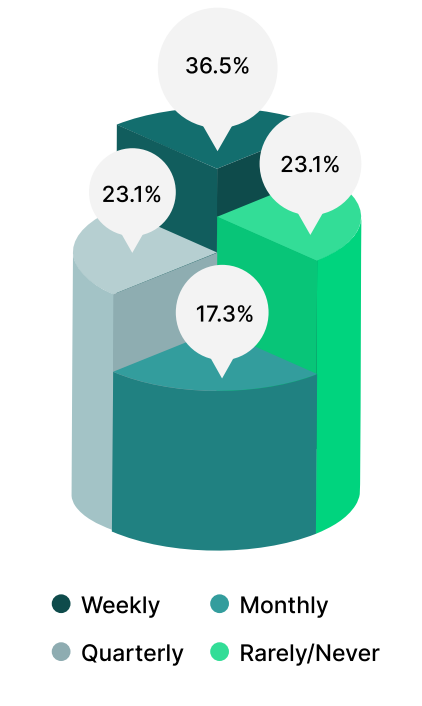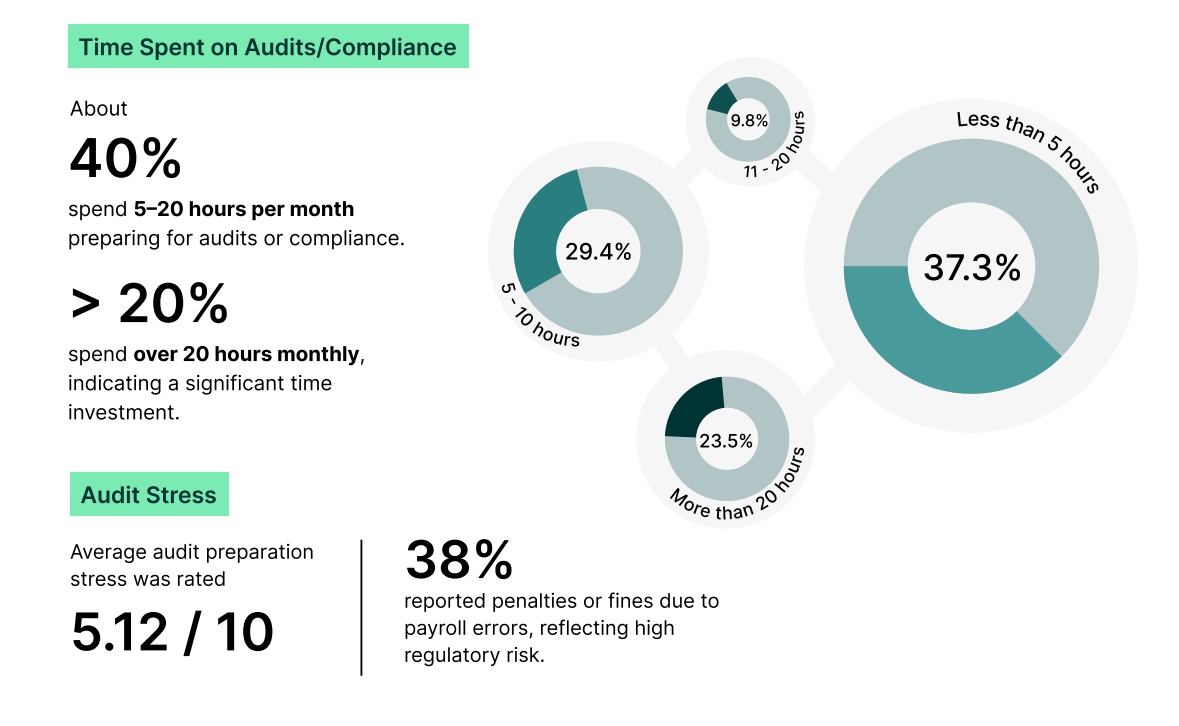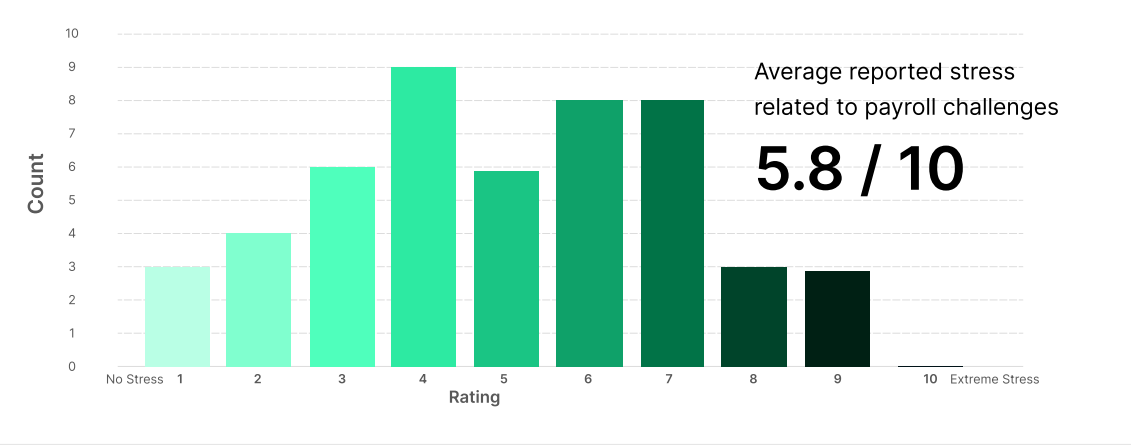
New research reveals the intense pressures and operational complexities that construction payroll professionals navigate daily
As National Payroll Week spotlights the essential role of payroll professionals across industries, a new report from ConstructionOwners Club, Lumber and Knowify exposes the unique and intensifying challenges faced by those working behind the scenes in construction.
The findings paint a stark picture of an industry where payroll teams operate under constant pressure, managing unprecedented complexity while bearing the weight of costly compliance failures.
The comprehensive report, "The Realities of Construction Payroll: Challenges for Back Office Staff," surveyed 50 payroll professionals across diverse construction companies, revealing a workforce under strain. Their daily reality involves navigating fluctuating labor forces, complex pay structures, and stringent regulatory requirements that would challenge even the most experienced administrators.

Construction's inherent unpredictability creates a perfect storm for payroll complexity. Unlike traditional office environments where workforce numbers remain relatively stable, construction payroll teams must constantly adapt to dramatic fluctuations driven by project phases, seasonal demands, and variable contract arrangements.
The survey reveals that 54% of construction companies experience workforce size changes on a weekly or monthly basis.
This constant flux means payroll administrators must continuously onboard new workers, process terminations, and adjust for varying hours and roles—all while maintaining accuracy across multiple job sites and geographical regions.
"The construction industry's dynamic nature means our payroll teams are essentially performing crisis management on a routine basis," explains one survey respondent. "We're managing full-time employees, part-time workers, subcontractors, union and non-union personnel, often across different states with different regulations."
This workforce volatility extends beyond simple headcount changes. Construction projects involve diverse skill sets and specializations, each with distinct pay rates, overtime rules, and classification requirements. A single project might simultaneously employ apprentices, journeymen, supervisors, and specialists—each governed by different wage structures and union agreements.
Get the complete survey findings and actionable recommendations for your construction payroll operations | Download Report
The most complex challenge identified by payroll professionals involves managing multiple pay rates and job classifications, with 26.9% of respondents citing prevailing wage and certified payroll compliance as their greatest difficulty.
This complexity stems from construction's unique regulatory environment, where federal, state, and local requirements often overlap and conflict.
Prevailing wage laws, which require contractors on public projects to pay workers wages and benefits equal to those prevailing in the local area, create particular challenges.
These requirements vary by location and project type, demanding specialized knowledge and meticulous record-keeping. A single error can result in significant penalties, project delays, and damaged client relationships.
Union and non-union rules add another layer of complexity, with 25% of respondents highlighting this as their most significant challenge.
Construction companies often employ both union and non-union workers on the same project, each group governed by different wage scales, benefit structures, and work rules. Payroll teams must navigate these distinctions while ensuring compliance with collective bargaining agreements and labor relations requirements.
Multi-state and multi-city regulations compound these challenges, affecting 17.3% of respondents most severely. As construction companies expand their geographic reach, payroll teams must master varying tax codes, worker classification rules, and reporting requirements across multiple jurisdictions.
A company working in three states might face dozens of different regulatory requirements, each with unique compliance deadlines and documentation standards.
Get exclusive insights from 50 construction payroll professionals—download the complete study today.

The regulatory complexity of construction payroll translates directly into extensive audit preparation requirements.
The survey reveals that payroll professionals spend substantial time each month on compliance activities, with 29.4% dedicating 5-10 hours monthly to audit preparation and an additional 23.5% spending over 20 hours on these activities.
This time investment reflects the high-stakes nature of construction payroll compliance. Unlike other industries where payroll errors might result in minor adjustments, construction payroll mistakes can trigger government audits, substantial penalties, and potential debarment from public projects. The survey found that 38% of respondents have experienced penalties or fines due to payroll errors, underscoring the significant financial and reputational risks involved.
The stress associated with audit preparation averages 5.8 out of 10, reflecting the intense pressure payroll teams face. This stress stems not only from the volume of work required but also from the constantly evolving nature of compliance requirements and the severe consequences of errors.
"Prevailing wage compliance remains one of the most intricate challenges in construction payroll, requiring careful attention to classification rules, audit preparation, and a deep understanding of regulatory nuances," notes one survey participant. "These complexities often contribute significantly to payroll errors and stress for administrators striving to maintain accuracy and avoid costly penalties."
Despite their expertise and dedication, construction payroll professionals regularly encounter errors that reflect the industry's inherent complexity. The survey reveals that 50% of respondents encounter 1-3 payroll errors monthly, while 25% experience more than 6 errors per month. These statistics highlight the challenging operational environment rather than professional competence.

Overtime miscalculations emerge as the leading cause of payroll errors, affecting approximately 38.5% of respondents. Construction's irregular work schedules, emergency projects, and weather-related delays create complex overtime scenarios that challenge traditional payroll systems. Workers might accumulate overtime across multiple job sites, work varying shifts, or receive premium pay for hazardous conditions—all requiring careful tracking and calculation.
Incorrect pay rate application follows closely, accounting for roughly 36.5% of errors. This reflects the challenge of managing multiple pay scales simultaneously. A single worker might earn different rates for different activities, qualify for various premiums based on work conditions, or transition between classification levels during a pay period.
Compliance misunderstandings and employee misclassification also contribute significantly to errors, cited by approximately 25% of respondents. These issues often stem from the complex intersection of labor laws, union agreements, and project-specific requirements that create gray areas in worker classification and payment obligations.

Behind these statistics lies a human story of dedicated professionals operating under intense pressure. The survey reveals average stress levels of 5.8 out of 10 related to payroll challenges, with many respondents describing the emotional toll of their responsibilities.
"Complex pay and classification rules combined with unpredictable schedules make payroll processing exhausting," shared one administrator. Another noted, "The constant worry of making costly errors that lead to audit penalties weighs heavily on our team."
This stress extends beyond working hours, with many payroll professionals reporting that job pressures affect their work-life balance. "I often work overtime myself to ensure payroll accuracy and compliance, which affects my work-life balance," explained one respondent. The irony of payroll professionals working unpaid overtime to process others' overtime compensation highlights the dedication these individuals bring to their roles.
The stress manifests in multiple ways: fear of costly penalties, concerns about employee satisfaction, pressure from management to maintain accuracy while processing increasing volumes, and the constant need to stay current with changing regulations. For many, each payroll cycle represents a high-stakes challenge where mistakes can have far-reaching consequences.

The survey reveals significant gaps between the tools available to construction payroll teams and the complexity of their responsibilities. Nearly 50% of respondents rate tracking and applying pay rates as moderately to extremely challenging, with 25% finding it extremely difficult. This suggests that current payroll systems often fail to address construction's unique requirements.
Traditional payroll software designed for stable office environments struggles with construction's dynamic workforce, multiple pay rates, and complex compliance requirements. Many teams resort to manual calculations, spreadsheet tracking, and work-around solutions that increase error risk and administrative burden.
The challenge is particularly acute for companies operating across multiple states or managing significant union workforces. These organizations face the greatest complexity but often lack specialized tools to manage their unique requirements effectively.
Construction payroll professionals have identified clear priorities for improving their operational environment. Enhanced training tops their wish list, particularly focused on complex pay and compliance rules that continue to evolve. Many express frustration with learning about regulatory changes after implementation rather than receiving proactive guidance.
Improved communication from job sites represents another critical need. Payroll accuracy depends heavily on timely and accurate time reporting from field personnel, yet communication gaps frequently create downstream problems. Better systems for capturing and transmitting payroll data could significantly reduce errors and administrative burden.
Technology solutions specifically designed for construction payroll complexity could address many current challenges. Systems that automatically handle multiple pay rates, track compliance requirements across jurisdictions, and integrate with project management tools could reduce both errors and stress levels.
Clearer guidance on compliance requirements would help teams navigate the regulatory maze more effectively. Many respondents expressed uncertainty about interpreting complex rules and regulations, leading to conservative approaches that increase administrative burden while potentially missing optimization opportunities.
The survey findings have broader implications for construction industry competitiveness and sustainability. As labor shortages persist and regulatory requirements continue expanding, the administrative burden on payroll teams will likely increase. Companies that fail to address these challenges risk losing experienced payroll professionals to less stressful industries.
Effective payroll management directly impacts worker satisfaction and retention. Payroll errors affect not only compliance but also employee trust and morale. In an industry already struggling with workforce challenges, payroll problems can exacerbate recruitment and retention difficulties.
Shreesha Ramdas, CEO and Co-founder of Lumber, emphasizes this connection: "Effective payroll management is the backbone of construction workforce wellbeing—streamlining processes and reducing errors not only eases stress for payroll teams but also strengthens overall project success."
As the construction industry grapples with labor shortages, project complexity increases, and regulatory requirements expand, the role of payroll professionals becomes increasingly critical. These dedicated individuals serve as the bridge between field operations and compliance requirements, ensuring that workers receive accurate compensation while companies maintain regulatory standing.
The survey results demonstrate that construction payroll is far more complex than traditional payroll functions, requiring specialized knowledge, crisis management skills, and exceptional attention to detail. Yet these professionals often operate with limited resources and recognition, facing significant stress while performing essential functions.
National Payroll Week provides an opportunity to recognize these contributions and commit to meaningful improvements. The construction industry's future depends partly on its ability to attract and retain skilled administrative professionals who can navigate increasing complexity while maintaining accuracy and compliance.
The path forward requires industry-wide recognition of payroll complexity, investment in appropriate tools and training, and commitment to supporting these essential workers. Only by addressing these challenges can the construction industry ensure that its payroll professionals can continue providing the expertise and dedication that keeps projects moving and workers paid accurately and on time.
The hidden burden carried by construction payroll teams deserves visibility and support. Their success directly impacts project outcomes, worker satisfaction, and company reputation. As the industry evolves, so too must its approach to supporting these critical behind-the-scenes professionals who keep the construction economy functioning smoothly.
Access the industry's first comprehensive study on construction payroll challenges and solutions. | Download Report